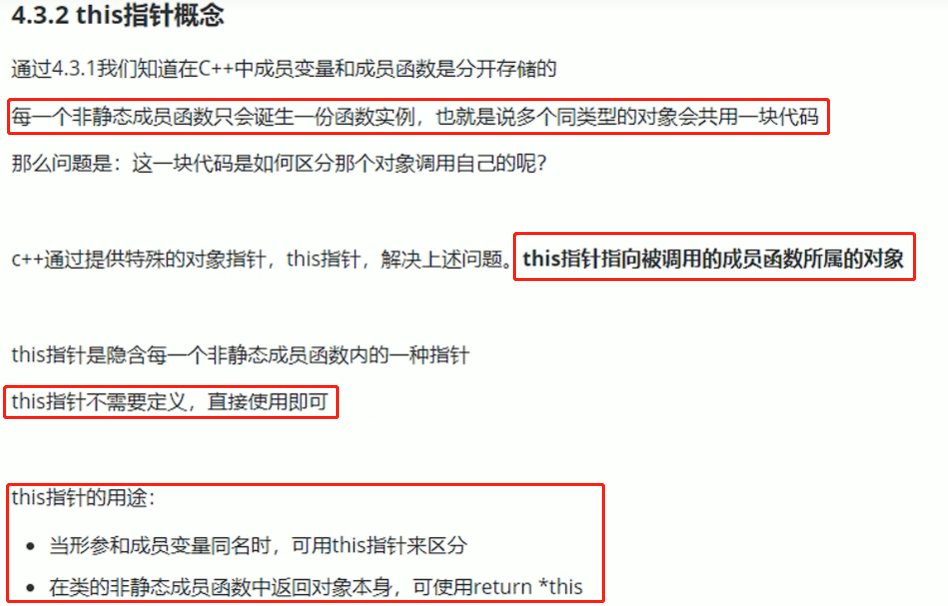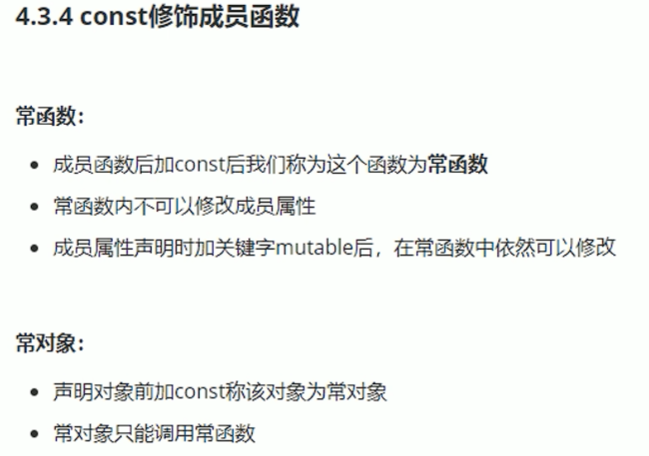C++黑马程序员——P115-117. this指针;空指针访问成员函数;const修饰成员函数
- P115. 类和对象——对象特性——this指针的用途
- P116. 类和对象——对象特性——空指针访问成员函数
- P117. 类和对象——对象特性——const修饰成员函数
- P115

1 //this 指针用途
2 //1.解决名称冲突
3 //2.返回对象本身用*this
4
5 class Person
6 {
7 public:
8 Person(int age)
9 {
10 age = age; //虽然我们的想法是:把传入的age赋值给类的age,但是编译器会认为这里的3个age都是同一份东西,和类的age没有关系
11 }
12 int age;
13 };
14
15 void test01()
16 {
17 Person p1(18);
18 cout << "p1的年龄为:" << p1.age << endl;
19 }
20
21 int main()
22 {
23 test01();
24
25 return 0;
26 }
运行结果:

修改:
1 class Person
2 {
3 public:
4 Person(int age)
5 {
6 //this指针指向 被调用的成员函数 所属的对象 后面p1调用了Person构造函数Person(int age)(即被调用的成员函数),此成员函数所属的对象是p1,所以后面的this指针指向p1
7 this->age = age;
8 }
9 int age;
10 };
代码其他部分不变;
运行结果:

2. 返回对象本身用*this
1 class Person
2 {
3 public:
4 Person(int age)
5 {
6 //this指针指向 被调用的成员函数 所属的对象
7 this->age = age;
8 }
9 Person& PersonAddAge(Person& p) //为什么返回值是 Person& 不是 Person
10 //如果返回的是 Person,它会创建一个新的对象,不是原来的
11 //如果返回的是 Person&,不会创建新的对象,会一直返回调用的对象
12 {
13 this->age += p.age;
14 return *this;
15 }
16 int age;
17 };
18
19 void test02()
20 {
21 Person p1(10);
22 Person p2(10);
23 //链式编程思想
24 p2.PersonAddAge(p1).PersonAddAge(p1).PersonAddAge(p1);
25 cout << "p2的年龄为:" << p2.age << endl;
26 }
27
28 int main()
29 {
30 test02();
31 return 0;
32 }
运行结果:

如果返回的是 Person 而不是 Person&
1 Person PersonAddAge(Person& p) //为什么返回值是 Person& 不是 Person
2 //如果返回的是 Person,它会创建一个新的对象,不是原来的
3 //如果返回的是 Person&,不会创建新的对象,会一直返回调用的对象
4 {
5 this->age += p.age;
6 return *this;
7 }
运行结果:

为什么是20不是40:
值方式返回局部对象,会调用拷贝构造函数(P108)
p2.PersonAddAge(p1).PersonAddAge(p1).PersonAddAge(p1) ,只有第一次的p2.PersonAddAge(p1)是作用于p2的,第一次调用完.PersonAddAge(p1)的函数后返回的不是p2而是p2的一个拷贝,所有后面两次PersonAddAge(p1)又分别是在两个不同的p2的拷贝上作用的,与实际的p2没有关系,所以p2.age=20;
- P116. 空指针访问成员函数
1 //空指针调用成员函数
2 class Person
3 {
4 public:
5 void ShowClassName()
6 {
7 cout << "this is Person class" << endl;
8 }
9
10 void ShowPersonAge()
11 {
12 //为了提高代码的健壮性:
13 if (this == NULL)
14 {
15 return;
16 }
17 cout << "age = " << m_age << endl;
18 }
19
20 int m_age;
21 };
22
23 void test01()
24 {
25 Person* p = NULL;
26 p->ShowClassName(); //没有问题
27 p->ShowPersonAge();
28 //报错,原因是传入的指针为NULL;cout << "age = " << m_age << endl 等价于 cout << "age = " << this->m_age << endl
29 //ShowPersonAge()函数加了if语句判断this是否为空之后,就不会报错了
30 }
31
32 int main()
33 {
34 test01();
35 return 0;
36 }
运行结果:

- P117. const修饰成员函数

常对象也可以调用加关键字mutable的成员
常函数:
1 class Person
2 {
3 public:
4 //this指针的本质是指针常量,指针的指向是不可以修改的(此时指针指向的值是可以修改的)
5 //Person* const this
6 //常函数
7 void ShowPerson()const //函数后加了const,this指针指向的值也不能修改了,此函数中的this指针本质上变为 const Person* const this
8 //成员函数后面加const,修饰的是this指针,让this指针指向的值不可以修改
9 {
10 //m_A = 100;//报错; m_A 与 this->m_A 相同
11 this->m_B = 100;
12 }
13
14 int m_A;
15 mutable int m_B; //加了mutable后,常函数中可以修改此成员属性;常函数 和 常对象 都可以修改m_B的值
16 };
常对象:
1 class Person
2 {
3 public:
4 ...
5 //普通成员函数
6 void func1()
7 {
8
9 }
10
11 int m_A;
12 mutable int m_B; //在 常函数 和 常对象 中都可以修改
13 };
14
15 void test02()
16 {
17 //常对象
18 const Person p2;//在对象前加const,变为常对象
19 //p2.m_A = 100; //报错,常对象不能修改普通的成员变量
20 p2.m_B = 200;
21 //常对象只能调用常函数
22 p2.ShowPerson();
23 //p2.func1(); //报错,func1不是常函数
24 }
(〃>_<;〃)(〃>_<;〃)(〃>_<;〃)
分类:
C++学习笔记






【推荐】国内首个AI IDE,深度理解中文开发场景,立即下载体验Trae
【推荐】编程新体验,更懂你的AI,立即体验豆包MarsCode编程助手
【推荐】抖音旗下AI助手豆包,你的智能百科全书,全免费不限次数
【推荐】轻量又高性能的 SSH 工具 IShell:AI 加持,快人一步
· winform 绘制太阳,地球,月球 运作规律
· AI与.NET技术实操系列(五):向量存储与相似性搜索在 .NET 中的实现
· 超详细:普通电脑也行Windows部署deepseek R1训练数据并当服务器共享给他人
· 【硬核科普】Trae如何「偷看」你的代码?零基础破解AI编程运行原理
· 上周热点回顾(3.3-3.9)